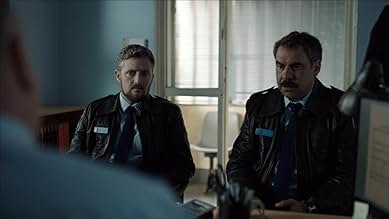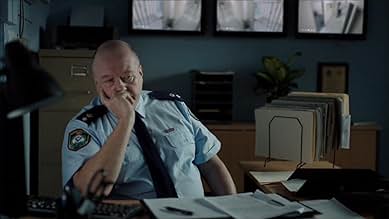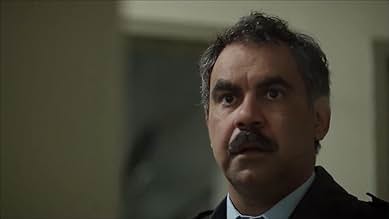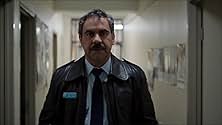Ajouter une intrigue dans votre langueThe troubled lives of struggling indigenous Australians in the tough, rundown neighborhood of the inner suburb of Redfern in Sydney.The troubled lives of struggling indigenous Australians in the tough, rundown neighborhood of the inner suburb of Redfern in Sydney.The troubled lives of struggling indigenous Australians in the tough, rundown neighborhood of the inner suburb of Redfern in Sydney.
- Récompenses
- 16 victoires et 16 nominations au total
Parcourir les épisodes
Avis à la une
This series is refreshingly different to all the formulaic cop shows/hospital dramas/sitcoms which dominate the TV landscape. The episodes deal with everyday issues in a realistic fashion; we are privileged to see some of Australia's best actors at work; and indigenous people are portrayed non-stereotypically. Not all the story lines are resolved neatly - just like real life, things sometimes turn out other than we would wish. Each episode is self-contained, but many characters appear in several eps with differing degrees of prominence, so someone who features in one episode as the protagonist may pop up later in a supporting role. If you like intelligent, thoughtful and thought-provoking drama, and you are an open-minded discerning viewer, I think you will find Redfern Now a rewarding experience.
Some Aussie shows, I take like a duck to water. Redfern Now is one of those shows. It's extremely well acted, especially the last one I saw, involving family rape, where the Aunt who copped it after the daughter, was so believable, in the wake of her ordeal, her horror aftermath, thanks to serial rapist (Hayes). The players are mostly an unknown cast of indigenous folk, but what a great pool of talent. They're all so good, where I really like Wayne Blair's cop character, especially in the last one, trying hard to let his personal opinions get in the way. In my opinion, this great acting stature all deserve recognition. I've never seen such high acting calibre from black folk. These are the people budding acting students need as tutors. The first episode I ever caught, involved a homosexual black, where his lover, was on a life support, and Noni Hazelhurst was the mother, again excellent of course, where she didn't want the plug pulled, and after it was, it created such major conflict, and a claustrophobic atmosphere between the warring parties, with such ferocity in Noni's character, drawing similarities to her A Place To Call Home, not her character, but intentions. It was kind of freaky. The latest episode I saw- the rape one, was really smart in how it manipulated the viewer, to it's conclusion, letting us think the worst. Redfern Now isn't just a good show, it's real life, and like real life, things can get ugly. Redfern Now, is a show, you must watch now. If you didn't know, Redfern is an inner city suburb, of Sydney, the west neighboring suburb of Surry Hills. You should visit it sometime.
Maybe one has to be Australian to like this series. But not for anyone who has experienced well executed drama. Having ploughed through 6 of the episodes picked from both series 1 and 2 we won't be watching any more. The basic messages are clearly well intentioned but the dialogue is simple and the scenes so repetitive we kept shouting "OK we've got the message".
The characters have little depth and the endings are mostly predictable after about 10 minutes. If this is the kind of drama that wins awards in Australia, then it is no wonder why the rest of the world views that part of the world as lacking culture. (Just as well the Sydney Opera house can counter that.)
The underlying story is generally good but just doesn't justify 50 minute episodes. Now weave several episodes together giving each story maybe 20 minutes air time and there just could be an interesting poignant mini series.
The characters have little depth and the endings are mostly predictable after about 10 minutes. If this is the kind of drama that wins awards in Australia, then it is no wonder why the rest of the world views that part of the world as lacking culture. (Just as well the Sydney Opera house can counter that.)
The underlying story is generally good but just doesn't justify 50 minute episodes. Now weave several episodes together giving each story maybe 20 minutes air time and there just could be an interesting poignant mini series.
Just watched this on Netflix. It was a really interesting show. I really love seeing movies or TV shows about different ethnicities living normal lives rather than as stereotypes. Indigenous Australians have always fascinated me. They rarely get seen on TV here in the US and I can't count the number of times I've seen aborigines portrayed as regular people on one hand. What always springs to mind is the David Bowie video "Let's Dance", that featured the young aborigine teens. I'd also seen Rabbit Proof Fence and a few other movies. There were some great episodes and it's a pity the show didn't last longer than twelve episodes.
As an American, my impression of indigenous Aussies has been of the dark-skinned aborigine bushmen tribes and peoples, so I expected to see more of people with a darker skin tone. While I recognize that like African Americans, there are many indigenous Aussies who are also a mix of Europeans and other races, what I see in the series is mostly mixed raced indigenous and island people. So of course my impression is that this cast is chosen for their appealing looks to interest white viewers rather than authenticity or true aboriginal culture. Forgive me for being ignorant but I've seen other Australian movies that featured aborigines who weren't light-skinned with European features yet this series has maybe one episode with a real blackfella with dark skin and his role is relegated to 10-15 seconds of screen time and four lines. I'm not saying the actors here shouldn't be included or recognized as great indigenous artists, quite the contrary. Many of the performances there are top notch. Deborah Mailman, Wayne Blair, Lisa Flanagan and Rarriwuy Hick especially stand out for great acting and beauty. I just would have preferred that the casting had been more inclusive of the full diaspora of the culture. The few other instances of dark- skinned aborigines in the series amount to background figures cast as homeless people or drunks with no dialogue.
As an American, my impression of indigenous Aussies has been of the dark-skinned aborigine bushmen tribes and peoples, so I expected to see more of people with a darker skin tone. While I recognize that like African Americans, there are many indigenous Aussies who are also a mix of Europeans and other races, what I see in the series is mostly mixed raced indigenous and island people. So of course my impression is that this cast is chosen for their appealing looks to interest white viewers rather than authenticity or true aboriginal culture. Forgive me for being ignorant but I've seen other Australian movies that featured aborigines who weren't light-skinned with European features yet this series has maybe one episode with a real blackfella with dark skin and his role is relegated to 10-15 seconds of screen time and four lines. I'm not saying the actors here shouldn't be included or recognized as great indigenous artists, quite the contrary. Many of the performances there are top notch. Deborah Mailman, Wayne Blair, Lisa Flanagan and Rarriwuy Hick especially stand out for great acting and beauty. I just would have preferred that the casting had been more inclusive of the full diaspora of the culture. The few other instances of dark- skinned aborigines in the series amount to background figures cast as homeless people or drunks with no dialogue.
This is a really poignant TV drama series that captures the reality of class, race, culture, identity, and attitude. What i find most compelling is that it is a window into the possible lives of people that face struggle every day because of prejudice, racism, poverty; it breaks down the stereotypes that the typical Australian psyche has formed of Indigenous peoples and creates a beautiful web of recognition for every 'Australian'. I find that every episode (I've watched episodes 1-4 thus far) has made me empathetic, laugh, cry, smile, relate and admire the message that this Indigenous drama carries to the people.
I give it 9 *'s because it takes a stab at issues that seem to be ignored or rarely said in the television arena and it does it incredibly well.
Australia needs to wake up to its past and reform our future. Unfortunately racism is still alive and well; and sadly isn't going away, because people hold onto racist attitudes rather than questioning the past. Maybe this drama can begin something that starts to make people learn; to critically reflect and to think about more than what's on the surface like Australia's treatment of Aboriginal people, what of the reality of asylum seekers, or the ridiculous misconception of Muslim's perpetrated by the media, or the appalling struggle of refugees/Boat people who go through desperate measures that we conveniently ignore, or the changing government policies/History Wars which obfuscate change, let alone other facts of our past like the White Australia Policy and our nations history such as the disgusting aspects of Darwinism that Australia has abused for ethnic cleansing and Australia's abhorred policies of the past Indigenous atrocities that continue today with 3rd world conditions for today's Aboriginal Communities in remote areas and the Kimberly; these are reasons why Redfern Now provides something fresh and interesting. People need to be awoken from apathy and ignorance; Redfern Now provides a wonderful glimpse into re-thinking Indigenous perspectives, and should delight anyone's curiosity with it's down-to-earth reality of people, class, gender, and indigenous struggle against bias and naivety.
I give it 9 *'s because it takes a stab at issues that seem to be ignored or rarely said in the television arena and it does it incredibly well.
Australia needs to wake up to its past and reform our future. Unfortunately racism is still alive and well; and sadly isn't going away, because people hold onto racist attitudes rather than questioning the past. Maybe this drama can begin something that starts to make people learn; to critically reflect and to think about more than what's on the surface like Australia's treatment of Aboriginal people, what of the reality of asylum seekers, or the ridiculous misconception of Muslim's perpetrated by the media, or the appalling struggle of refugees/Boat people who go through desperate measures that we conveniently ignore, or the changing government policies/History Wars which obfuscate change, let alone other facts of our past like the White Australia Policy and our nations history such as the disgusting aspects of Darwinism that Australia has abused for ethnic cleansing and Australia's abhorred policies of the past Indigenous atrocities that continue today with 3rd world conditions for today's Aboriginal Communities in remote areas and the Kimberly; these are reasons why Redfern Now provides something fresh and interesting. People need to be awoken from apathy and ignorance; Redfern Now provides a wonderful glimpse into re-thinking Indigenous perspectives, and should delight anyone's curiosity with it's down-to-earth reality of people, class, gender, and indigenous struggle against bias and naivety.
Le saviez-vous
- AnecdotesDeborah Mailman was nominated for a 2015 Australian Academy of Cinema and Television Arts Award in the Best Lead Actress in a Television Drama category for her role as Lorraine in Redfern Now (2012).
- ConnexionsReferenced in The Making of Emu Runner (2018)
Meilleurs choix
Connectez-vous pour évaluer et suivre la liste de favoris afin de recevoir des recommandations personnalisées
- How many seasons does Redfern Now have?Alimenté par Alexa
Détails
Contribuer à cette page
Suggérer une modification ou ajouter du contenu manquant

Lacune principale
By what name was Redfern Now (2012) officially released in India in English?
Répondre


























